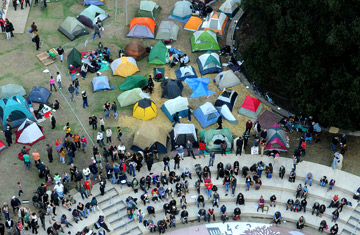
Occupy Oakland protesters and their tents line a plaza near city hall in Oakland, Calif., on Oct. 28, 2011
Ugly images from last week's clash in front of city hall have put authorities on the defensive and energized the Occupy Oakland crowd, whose encampment continued to swell over the weekend. Residents used wooden pallets to begin rebuilding the tent city razed by cops on Oct. 25. The site features everything from free medical supplies and new-age treatments to vegan food and day care. At a curbside open-mike gathering, several people decried the police violence with angry rants and poems. Most of those present were looking forward to the Nov. 2 citywide general strike. "To the streets! Shut down Oakland. If we cannot live, we will not work!" read one of the posters plastered on downtown walls.
The plaza in front of city hall belongs to the protesters again. But not everyone is pleased about it — despite Oakland's proud tradition of civil disobedience. Frustrations are most acute among small-business owners downtown who, under normal circumstances, must contend with lean foot traffic in a poor California city with high unemployment. While many local merchants have thrown their support behind the protests, a significant number are upset over the loss of revenue incurred over the past two weeks, insisting that would-be customers have been intimidated by the charged atmosphere.
"Business has been horrible. These protests have really hurt us," says Trang Tran, 30, manager of Saigon Restaurant on the edge of the plaza. "Some days, no one comes to lunch." He estimates that patrons have dropped off by 75% since Occupy Oakland kicked off. He grumbles over the eyesore of the portable toilets out front. Moji Ghafouri, the owner of nearby Caffe Teatro, says protesters smashed one of her windows. She asserts that city authorities are to blame for failing to enforce rules they created.
City merchants readily recall having to shut down when a pair of 2010 demonstrations against the police killing of Oscar Grant, an unarmed African-American male, turned violent. In March of that year, another protest in response to education cuts closed sections of Interstate 880 when scores of marchers moved onto the freeway during the evening rush hour.
What's more, some blue collar citizens far removed from the plaza complain that precious funds are being squandered on the movement in a city that has endured heavy budget cuts in recent years. José, 57, the manager of a copy shop in West Oakland, would rather see limited resources spent on a struggling education system that may soon lose about 15 schools. Better policing in his neighborhood would also help. "Every other day I have to clean graffiti off these walls," he says.
Protesters counter that they are not the ones who wasted taxpayer dollars by deploying riot police and cleanup crews, insisting that they can look after their own turf. Bob, 25, a part-time teacher giving information to passersby at the plaza, says camp residents have gotten better about managing volatile elements that were an issue at the outset. On three occasions in the past day, he notes, individuals acting violently were promptly and peacefully removed. "We need to be tolerant but can also police our own if need be," he says. "We're not going anywhere."
Indeed, the movement is digging in for the long haul, with a Wednesday general strike aimed at consolidating the past week's gains. At a nearby table, Sonya, 23, from Yonkers, N.Y., stenciled, "Ask Me Why I'm Striking" onto T-shirts with spray paint for a gaggle of children who had visited with their parents. The public-health intern could sympathize with merchants reluctant to lose a day's income. "It's scary to leave work for a day, to have no business for a day," she says. "But in the long term, it's small businesses and workers that are getting screwed over. They should weigh the long-term benefit with short-term costs — it's really about the big picture."
So far, unions, teachers' associations and students have expressed support for the strike, though some are on the fence about whether they will take part on such short notice. Less certain is the participation of small businesses that may back the movement in spirit but are reluctant to close their doors for economic reasons.
"Small businesses like mine just can't afford to be closed," says Alvin Collier, 52, the owner of Alvin's Automotive Recycling in West Oakland. He says he's not against the protests but must prioritize the needs of his seven employees, who rely on their income to pay bills at the start of a new month. Meanwhile, across the street from the occupied plaza, James Hartig, 29, a clerk at De Lauer's 24-hour newsstand, says the business has benefited from an influx of late-night coffee seekers among the protesters. He says that despite the call for solidarity with the general strike, he expects the newsstand to remain open as usual.
Then there are those willing to observe the strike, even if it hurts already-slow business a little more. Steve, 25, an employee at a downtown store called Oaklandish, which sells homegrown art and clothing celebrating the city, concedes that "a lot of people are walking around here, but less are coming in [to shop]." "It's kind of awkward," he says. Nevertheless, says the store's manager, Aaron, 28, "we're in the thick of it." He says Oaklandish's doors will not open on Wednesday in support of the strike.
But the manager has one caveat: music will be played into the streets, he says, in homage to the city's last general strike — in 1946 — when unions shut Oakland down for 56 hours. That year, bars were permitted to stay open but could serve only beer. Jukeboxes could play but had to be moved out onto sidewalks for the public to enjoy.
